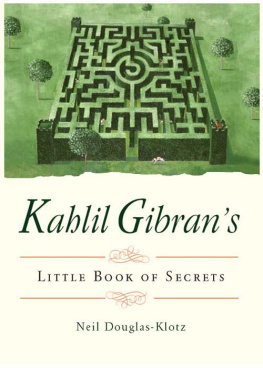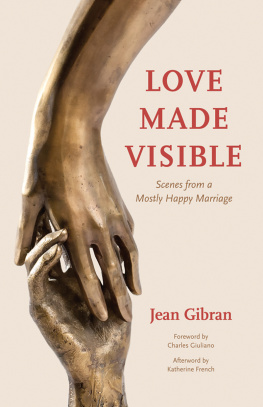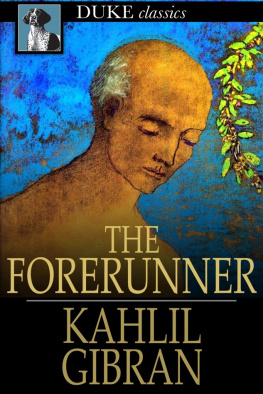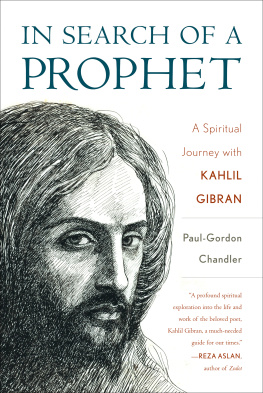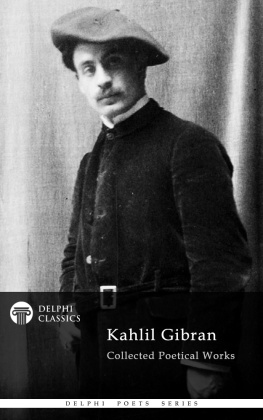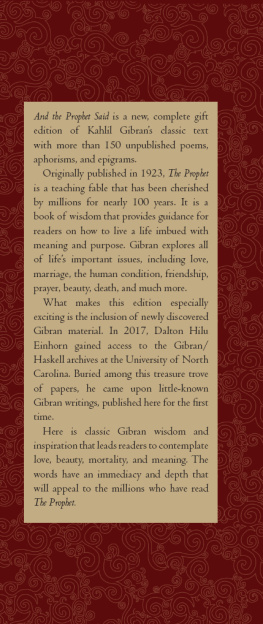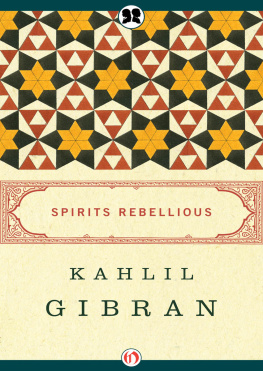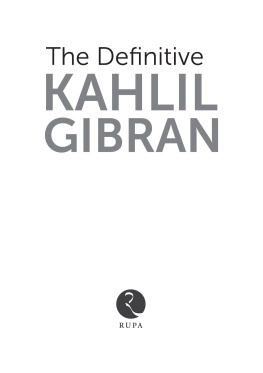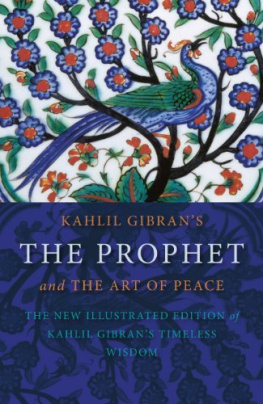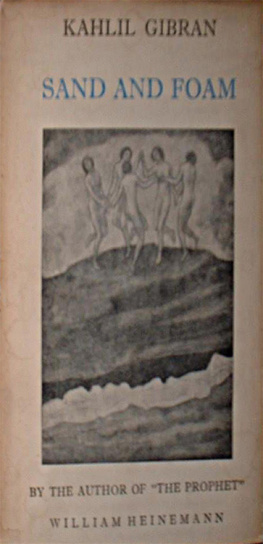Kahili Gibran - Kahlil Gibrans Little Book of Secrets
Here you can read online Kahili Gibran - Kahlil Gibrans Little Book of Secrets full text of the book (entire story) in english for free. Download pdf and epub, get meaning, cover and reviews about this ebook. year: 2019, publisher: Hampton Roads Publishing, genre: Romance novel. Description of the work, (preface) as well as reviews are available. Best literature library LitArk.com created for fans of good reading and offers a wide selection of genres:
Romance novel
Science fiction
Adventure
Detective
Science
History
Home and family
Prose
Art
Politics
Computer
Non-fiction
Religion
Business
Children
Humor
Choose a favorite category and find really read worthwhile books. Enjoy immersion in the world of imagination, feel the emotions of the characters or learn something new for yourself, make an fascinating discovery.
- Book:Kahlil Gibrans Little Book of Secrets
- Author:
- Publisher:Hampton Roads Publishing
- Genre:
- Year:2019
- Rating:5 / 5
- Favourites:Add to favourites
- Your mark:
- 100
- 1
- 2
- 3
- 4
- 5
Kahlil Gibrans Little Book of Secrets: summary, description and annotation
We offer to read an annotation, description, summary or preface (depends on what the author of the book "Kahlil Gibrans Little Book of Secrets" wrote himself). If you haven't found the necessary information about the book — write in the comments, we will try to find it.
Kahlil Gibrans Little Book of Secrets — read online for free the complete book (whole text) full work
Below is the text of the book, divided by pages. System saving the place of the last page read, allows you to conveniently read the book "Kahlil Gibrans Little Book of Secrets" online for free, without having to search again every time where you left off. Put a bookmark, and you can go to the page where you finished reading at any time.
Font size:
Interval:
Bookmark:


Copyright 2019
by Neil Douglas-Klotz
All rights reserved. No part of this publication may be reproduced or transmitted in any form or by any means, electronic or mechanical, including photocopying, recording, or by any information storage and retrieval system, without permission in writing from Red Wheel/Weiser, LLC. Reviewers may quote brief passages.
Grateful acknowledgement is made to Nicholas Martin for permission to reprint excerpts from Gibran's play Iram of the Pillars as translated in The Arabic Plays of Kahlil Gibran, Nicholas Martin, editor. Copyright Nicholas R.M. Martin 2015, reprinted with permission, all rights reserved.
Cover design by Jim Warner
Cover illustration, Maze by Rebecca Campbell, Private Collection/Bridgeman Images
Interior by Deborah Dutton
Typeset in ITC Garamond Std
Hampton Roads Publishing Company, Inc.
Charlottesville, VA 22906
Distributed by Red Wheel/Weiser, LLC
www.redwheelweiser.com
Sign up for our newsletter and special offers by going to www.redwheelweiser.com/newsletter
ISBN: 978-1-57174-834-8
Library of Congress Cataloging-in-Publication Data available upon request.
Printed in Canada MAR
10 9 8 7 6 5 4 3 2 1
FOR THOSE WHO LONG TO HEAR THE SECRET
THAT CANNOT BE SPOKEN.






In the past ninety years, Kahlil Gibran's The Prophet has become one of the most read and quoted books in English. Yet a few contemporary critics have labeled it overly simplistic and philosophically lightweight. The Prophet, they say, may have appealed to the 60s generation of new age hippies and greeting card factories, but Gibran skates the surface of real spiritual or mystical thought. The selections in this small volume strongly contradict such opinions. Gibran's best writing expresses a deep, authentic, native Middle Eastern spirituality, albeit one that bridges ordinary religious boundaries.
These new little book collections take a fresh look at Gibran's words and wisdom, taking into account the major influences in his life: his Middle Eastern culture, nature mysticism, and the Arabic language in which he thought. One could easily argue that what the average reader of Gibran in the 1920s found exotic was the way he clearly expressed a region that most regarded as a mystery. Nearly a hundred years later, understanding the Middle Eastern conundrumespecially the way that a very different culture considers the meaning and purpose of lifehas moved from the level of a philosophical problem to become a practical matter of everyday survival.
The book before you collects Gibran's words on life's big questions and the mysteries of the spiritual path. The first book in the series collected his writings on life and nature. The second book focused on love and relationships, and the final one will collect his writings on practical wisdom for daily life, both in community and solitude.
Many of Gibran's early writings focus on life's puzzles and riddlesthose questions that cause us to stop what we're doing and ask, why? Things we at first see as opposites seem upon consideration to complement each other. How could we know what good is, for instance, without an exposure to its opposite, which we call bad? Could we truly know life without some intuition of death or feel successful without some experience of failure? For those who reflect on life (even a little), questions like these often provide the starting place for a psychological or spiritual search. How can a person hold opposite points of view at the same time? Why don't people act logically, based on facts? What is, in fact, a fact? Do I always make important choices in my life based on factual information? Or do I rarely have all of the information before I jump into a new job, a new relationship, or a major move?
We can see an influence of Gibran's early life story on his fascination with such questions. He was uprooted from his native Lebanon at the age of twelve by his mother who brought his siblings and him to the USA in 1895. Like many migrants today, she was escaping a hopeless situation: poverty, a failed marriage, and a husband in prison for embezzling from the government. Gibran experienced a radical disconnection from his relatives and friends in the move to late 19th century urban Boston, a very different culture from that of his childhood. According to Gibran, life in Ottoman-controlled Lebanon was both insular and feudal, with local lords and church officials in an unholy alliance to keep the fellahinthe peasants and those who worked the landin virtual serfdom.
We can imagine that from an early age Gibran began to see things from two points of viewthat of the native of rural Lebanon and that of the American city dweller. Seeing from two points of view at the same time, a split awareness, could only be integrated by either taking a higher view or going crazy. Fortunately for Gibran (and us), he was able to do the former, although toward the end of his young life, the attempts to drown his extreme sensitivities in alcohol finally caught up with him.
Gibran found help in his search for balance and meaning in a number of diverse spiritual influences.
First, as I noted in the introductions to the earlier collections, Gibran was raised as a Maronite Christian, an Eastern church allied to the Roman Catholic but which until the 18th century spoke and used in liturgy the Syriac language, related to Jesus' native Aramaic. The Aramaic-speaking churches historically viewed Jesus, the prophet of Nazareth, as a human being, a small-s son of God, who uniquely fulfilled his destiny and expressed the divine life in a way open to all of us. In this sense, we could all become children of God, that is, of Sacred Unity (the literal translation of the Aramaic word for God, Alaha, as well as the equivalent Arabic word Allah).
For instance, in a selection contained here, Gibran criticizes those who would only worship Jesus, but not try to become like him spiritually:
They would honor the man unknown to them.
What consolation is there in a man like themselves,
a man whose kindliness is like their own kindliness,
a god whose love is like their own love,
and whose mercy is in their own mercy?
They honor not the man, the living man,
the first man who opened his eyes
and gazed at the sun with eyelids unquivering.
Nay, they do not know him,
and they would not be like him.
The ideal of God as unitya unity that contains all oppositesunites the various threads of Middle Eastern mysticism that Gibran expresses. Ultimately, there is no God
Next pageFont size:
Interval:
Bookmark:
Similar books «Kahlil Gibrans Little Book of Secrets»
Look at similar books to Kahlil Gibrans Little Book of Secrets. We have selected literature similar in name and meaning in the hope of providing readers with more options to find new, interesting, not yet read works.
Discussion, reviews of the book Kahlil Gibrans Little Book of Secrets and just readers' own opinions. Leave your comments, write what you think about the work, its meaning or the main characters. Specify what exactly you liked and what you didn't like, and why you think so.

